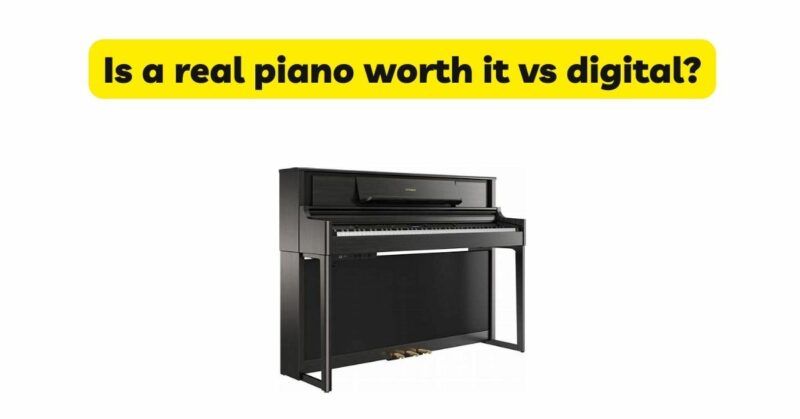The debate between real pianos and digital pianos has been ongoing for years, with passionate arguments on both sides. Traditionalists advocate for the authenticity and timelessness of acoustic pianos, while proponents of digital pianos highlight their technological advancements and convenience. In this article, we will delve into the factors that contribute to the worth of a real piano compared to a digital piano, enabling readers to make an informed decision based on their preferences, needs, and circumstances.
- Sound Authenticity: One of the primary considerations when comparing real pianos to digital pianos is the authenticity of sound. Acoustic pianos produce a unique and organic sound, resulting from the interaction of strings, hammers, and soundboard resonance. The harmonics, overtones, and dynamic range of an acoustic piano cannot be replicated precisely by digital instruments. While digital pianos have made significant advancements in sound reproduction, there is still a discernible difference in the depth, richness, and complexity of the acoustic piano sound.
- Touch and Feel: The touch and feel of a piano greatly contribute to the playing experience. Acoustic pianos feature weighted keys that respond to the nuances of touch and allow for expressive playing. The action of pressing the keys translates into the mechanism of hammers striking the strings, resulting in a tactile and dynamic feedback. Digital pianos have made significant strides in replicating the touch of acoustic pianos through weighted keys with graded hammer action. However, there can still be subtle differences in response and feedback, impacting the overall playing experience, particularly for experienced pianists.
- Emotional Connection and Inspiration: Real pianos hold a certain romanticism and emotional connection that many musicians cherish. The authenticity, history, and craftsmanship of acoustic pianos can inspire and evoke a deeper sense of connection with the instrument. The physical presence of an acoustic piano in a space adds an element of beauty and elegance, enhancing the overall ambiance and artistic experience. For some, the ritual of sitting at a real piano and interacting with the instrument becomes an integral part of their creative process and musical journey.
- Longevity and Value: Acoustic pianos are often considered long-term investments due to their durability and the potential for appreciation in value. High-quality pianos, properly maintained, can last for generations and even become family heirlooms. Additionally, well-maintained acoustic pianos tend to retain their value over time, making them potential assets. In contrast, digital pianos typically depreciate in value as newer models with advanced features are introduced to the market.
- Maintenance and Cost: Acoustic pianos require regular maintenance, including tuning, voicing, and occasional repairs. These costs can add up over time, and the need for a skilled technician increases the overall expense. In contrast, digital pianos have minimal maintenance requirements. They do not require tuning, are not affected by changes in temperature or humidity, and have fewer mechanical components that can malfunction. Digital pianos provide a more cost-effective solution, particularly for those with budget constraints or limited resources for ongoing maintenance.
- Convenience and Flexibility: Digital pianos offer unparalleled convenience and flexibility. They are compact, lightweight, and portable, making them ideal for musicians who frequently perform, travel, or have limited living spaces. Digital pianos can be easily moved, require no special installation, and often come with headphone connectivity, allowing for silent practice. They also offer a range of additional features such as recording capabilities, a variety of instrument voices, and connectivity options for seamless integration with other devices and music software.
Conclusion: The question of whether a real piano is worth it compared to a digital piano ultimately depends on individual preferences, needs, and circumstances. Real pianos offer an authentic sound, a tactile playing experience, emotional connection, and long-term value. However, they come with higher maintenance costs, require dedicated space, and may not be as convenient for those with mobility or space constraints. On the other hand, digital pianos provide convenience, technological advancements, affordability, and versatility, although they may lack the same level of sound authenticity and emotional connection. Ultimately, the choice between a real piano and a digital piano is a deeply personal one, considering factors such as sound preference, playing experience, lifestyle, budget, and future aspirations as a musician.

